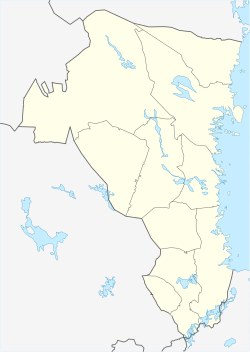Bollnäs
| Bollnäs | |
|---|---|

Bollnäs Missionskyrka
|
|
| Coordinates: 61°20′53″N 16°23′41″E / 61.34806°N 16.39472°ECoordinates: 61°20′53″N 16°23′41″E / 61.34806°N 16.39472°E | |
| Country | Sweden |
| Province | Hälsingland |
| County | Gävleborg County |
| Municipality | Bollnäs Municipality |
| Charter | 1942 |
| Area | |
| • Total | 12.87 km2 (4.97 sq mi) |
| Elevation | 53 m (174 ft) |
| Population (31 December 2010) | |
| • Total | 12,842 |
| • Density | 998/km2 (2,580/sq mi) |
| Time zone | CET (UTC+1) |
| • Summer (DST) | CEST (UTC+2) |
| Postal code | 821 xx |
| Area code(s) | (+46) 278 |
| Website | Official website |
Bollnäs is a Swedish locality and the seat of Bollnäs Municipality, in Gävleborg County, Sweden. It had 12,842 inhabitants in 2010.
The first recording of Bollnäs in writing is from 1312 when a vicar named Ingemund referred to it as Baldenaes, meaning "the large isthmus," referring to the isthmus into a nearby lake. Before becoming known as Bollnäs, its name was Bro By (lit. Bridge Village).
Bollnäs has a station along the Northern Railline (Norra Stambanan), which it was connected to in 1878. The town became a main base for further northern expansion of the railroad. In 1884, it became a primary maintenance and repair workshop for the railroad. The railroad was the largest employer in Bollnäs for the greater part of the 20th century, until the 1990s when it was closed due to its location being no longer optimal. Bollnäs became a city in 1942, nowadays an honorary title without administrative significance.
Bollnäs is twinned with Shepton Mallet, England.
Bandy is the locality's most popular sport. Bollnäs GIF play in the highest division Elitserien. In 2010, they reached the Swedish final for the first time since 1956. In 2011, they reached the finals and lost in overtime after a controversial offside penalty.
The Bollnäs church was built in the 14th and 15th centuries. An opening ceremony took place on November 3, 1468, probably for the church tower. Later alterations include the addition of the north and south transepts, built 1753-1755. The church hosts a collection of wooden medieval sculptures larger than any other parish church in the Nordic countries. Three of the altarpieces are major works of art from the late 15th century or early 16th century, including an altarpiece dedicated to Virgin Mary made by Haaken Gulleson c. 1520. The church's eucharistic chalice, with its paten, is another valuable piece dating from the same period.
...
Wikipedia


